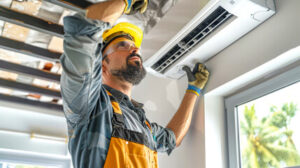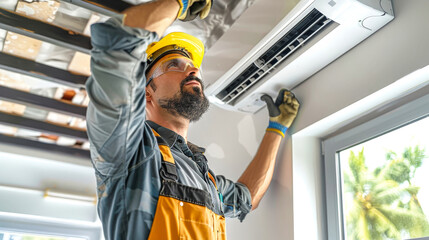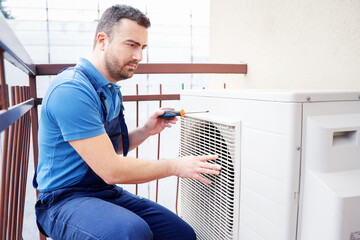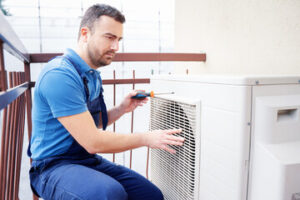HVAC systems are more than just air conditioners, they are a way to fully transform your indoor environment. Learn about costs, key terms, products and basic maintenance schedules in this helpful guide.
An HVAC system circulates conditioned air through a network of ducts. The blower fan in the air handler moves cooled or warmed air through the ducts to vents and registers in rooms.
Energy efficiency in HVAC refers to the effectiveness with which heating, ventilation, and air conditioning systems use power. The more efficient the system, the less energy it consumes to heat and cool a space, leading to significant cost savings and a smaller carbon footprint. Energy-efficient HVAC technologies range from variable-speed compressors that adjust to cooling or heating demand to improved coil designs that maximize heat transfer. These advancements allow newer systems to operate at peak performance with fewer resources.
Considering that HVAC systems account for a large portion of a building’s overall energy usage, any substantial effort to reduce energy costs and carbon emissions must prioritize HVAC efficiency. The goal is to minimize energy consumption without sacrificing indoor comfort, temperature, humidity, and pressure levels.
Many factors contribute to energy usage, including the size of the space that needs to be conditioned and how often it is used. However, investing in efficient systems and implementing HVAC optimization techniques can help reduce energy consumption substantially. For example, using smart thermostats that enable zone control and automated scheduling can reduce energy consumption in spaces that are not frequently occupied. Incorporating energy management systems into the HVAC infrastructure also enables facilities to gain valuable insights on energy usage and make adjustments accordingly.
As the world continues to struggle with climate change and the need for sustainable living, every step towards energy efficiency counts. By embracing advanced technology, reducing unnecessary energy use, and optimizing HVAC operations, homeowners can reap a host of benefits that go well beyond immediate cost savings.
In addition to lowering electricity bills, an energy-efficient system will run for longer periods without suffering from excessive wear and tear. This reduced energy demand helps cut carbon dioxide emissions, which in turn mitigates the effects of climate change. Additionally, efficient HVAC systems last longer than traditional systems, cutting repair costs and extending their lifespan. This can significantly improve a property’s resale value and enhance its appeal to prospective buyers. As energy demands continue to grow and the need for environmental preservation becomes more urgent, it is vital that we all make a conscious effort to reduce our HVAC energy consumption.
Comfort
The goal of an HVAC system is to provide you with a comfortable living environment. In addition to heating and cooling, modern home comfort systems include ventilation that brings fresh air into a room while forcing stale air out. This helps to improve indoor air quality and reduce the buildup of pollutants, such as dust, smoke, mold, odors, and other harmful particles.
Thermal comfort refers to an individual’s subjective satisfaction with the thermal environmental conditions of their occupied space. It can be influenced by personal factors and by the design of the building or enclosure. ASHRAE (American Society of Heating, Refrigerating and Air-Conditioning Engineers) has a standard called ASHRAE 55 that specifies combinations of indoor thermal environmental conditions and personal factors that can satisfy the majority of occupants of a space.
Various factors must be considered in determining thermal comfort, such as the design operative temperature, humidity, and indoor load. The magnitude of fluctuating loads, the speed of change in ambient temperatures and humidity, and how quickly the HVAC system can respond to these changes are also important considerations.
In addition to heating and cooling, today’s high efficiency home comfort systems often include ventilation and dehumidification capabilities. The ventilation systems help to improve indoor air quality by cycling fresh air into your living space and forcing stale air out, which can reduce the buildup of pollutants and other contaminants. The dehumidification capabilities of many new home comfort systems increase indoor humidity in the winter and decrease it in the summer, ensuring that your indoor environment is always comfortable.
When evaluating a new HVAC system, be sure that your contractor performs proper load calculations. This will ensure that your system is the right size for your home and prevent hot and cold spots. It will also prevent the system from running continuously, which can wear out the components and lead to higher repair bills down the road. In addition, newer HVAC systems are more energy efficient than older models, which can save you a significant amount of money on your utility bills. Combined with renewable energy sources, such as solar panels, these savings can be even greater.
Maintenance
A maintenance plan is a crucial component of ensuring your HVAC system runs efficiently. This prevents breakdowns and costly repairs that may result from a lack of regular attention to the equipment. The best way to keep your energy bills low and prevent repair costs is to have routine inspections performed. These can be as simple as a weekly check of your air filter or a monthly review of indoor vents to make sure they’re clear of debris and not blocked by furniture.
Regular maintenance also helps to spot problems early on, so they don’t have a chance to get out of hand. This allows you to get the repairs done before they become bigger issues that can cost more money and disrupt your daily routine.
HVAC systems are found in homes, offices, commercial buildings and even on vehicles. They are used to control temperature and humidity in the atmosphere, ensuring safe and comfortable environments for humans and animals to live and work.
Preventive maintenance can take many forms, from manual checklists to using CAFM software to create a preventive HVAC maintenance strategy. This could include checking air filters, examining refrigerant lines, cleaning and adjusting fans and chillers, testing gas connections, and more.
The main purpose of an HVAC repair technician is to diagnose and resolve heating, ventilation, and air conditioning issues. These issues can include faulty thermostats, clogged air filters, refrigerant leaks, or any number of other problems. HVAC repair technicians can also perform routine maintenance to reduce energy costs and extend the lifespan of the system.
Most common HVAC repairs are the result of a lack of routine maintenance or specific system failures. For example, a capacitor can fail and stop working or begin to lose their efficiency. This will often cause a system to start having trouble starting, making it difficult to use.
Other issues that can be prevented by routine maintenance include uneven cooling or heating and a clogged air filter. If you’re experiencing any of these problems, it’s time to call your local Carrier expert for a service visit.
Installation
There are a few key components to HVAC systems, including heating units, ventilation ducts, and air conditioning. HVAC technicians can help customers select the best equipment for their needs based on factors such as building size, climate, and energy efficiency ratings. During installation, they may also perform a system audit to identify potential problems that can be addressed before they occur.
Before the installation process begins, HVAC professionals will assess the space and determine the type and size of system needed to meet the demands of the building or home. They’ll also consider things like whether the space has existing ductwork or is a new construction. This step is important because a HVAC system that is too small or too large can lead to inefficient operation and high utility bills.
The next step is to install the air conditioner or heater. Depending on the type of HVAC system, the team may need to remove existing ductwork or build new ducts to accommodate the new equipment. They’ll also need to replace or repair the refrigerant lines. Ideally, these lines will be replaced with new ones, as the oil in an old set can’t be mixed with the new refrigerant. If this isn’t possible, Keller HVAC technicians will need to flush and clean the old line sets before they can be used again.
Once the new system is installed, the team will test it to make sure everything works as expected. This can be a lengthy process, especially if ductwork is involved. The final step is to ensure the unit meets local codes and zoning requirements. Once all of that is done, the system is ready to use!
When you’re looking for a reliable HVAC contractor, it’s important to choose one who is thorough and committed to perfection. This will ensure that you have a quality system that provides efficient comfort for years to come.
When choosing an HVAC company, it’s a good idea to ask about their warranty options. A reputable company will offer at least a one-year warranty on all work performed. They should also provide a list of maintenance tips that will help you keep your system running efficiently.



